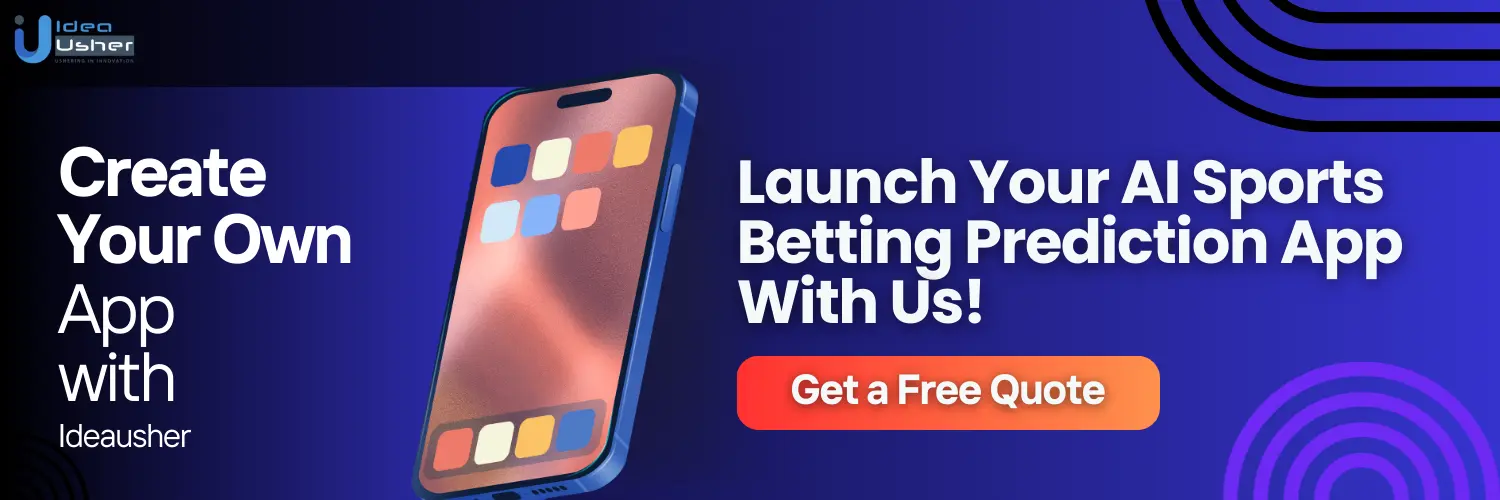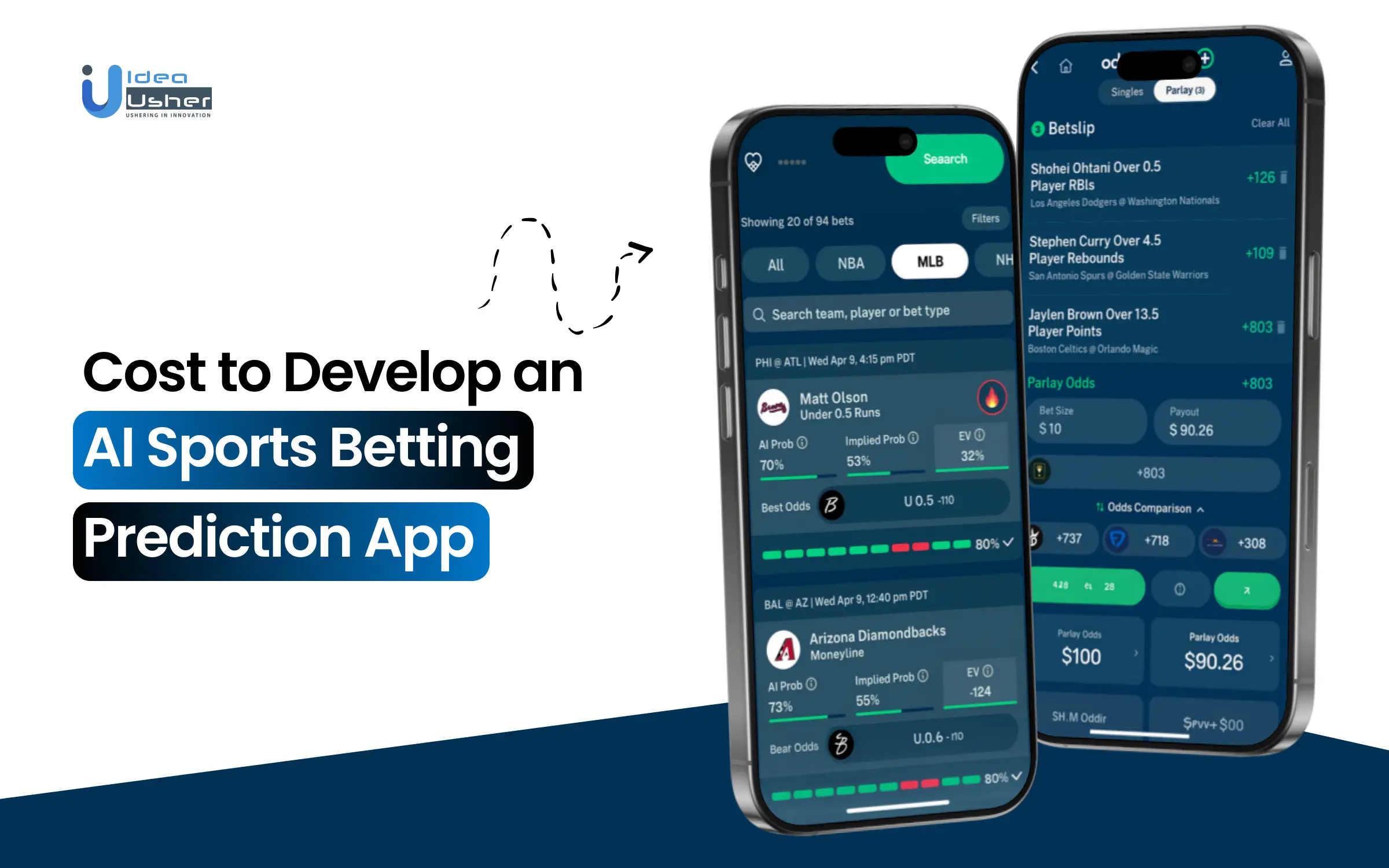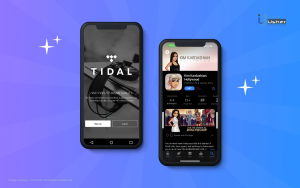AI sports betting prediction apps have changed how users approach wagering by providing data-driven forecasts based on historical performance, player statistics, and real-time analytics. These platforms use machine learning algorithms to identify patterns, assess probabilities, and deliver accurate betting recommendations that can improve decision-making. With the growing demand for precision and transparency, such apps are becoming essential for bettors seeking a competitive edge.
Estimating the cost of developing an AI sports betting prediction app requires a careful assessment of its core features, complexity, technology stack, and integration requirements. As we have helped many enterprises launch their AI products, especially in the sports betting industry, IdeaUsher has the expertise to guide development, optimize resources, and deliver high-performing solutions that meet both user expectations and business objectives.

Why You Should Invest in Launching an AI Sports Betting Prediction App?
The global sports betting market is growing rapidly, valued at USD 100.9 billion in 2024 and projected to reach USD 187.39 billion by 2030 with an 11% CAGR from 2025. This growth is fueled by legalization, tech advances, and demand for data-driven betting.
Underdog, an AI-powered sports betting platform, raised $70 million in Series C, totaling $140 million and valuing at $1.23 billion in 2025. This shows investor confidence in AI-driven models, highlighting data science and analytics’ potential in sports.
ALT Sports Data, an AI platform for niche sports like Formula 1 and the World Surf League, got $5 million in seed funding. This shows the rising demand for AI data in specialized sports and growing interest in expanding betting beyond traditional markets.
Billy Bets, an AI sports betting agent, raised $1 million in pre-seed funding from Coinbase Ventures, Serge Ibaka, and CMS Holdings. It highlights the growing appeal of AI-powered betting agents to disrupt traditional systems and ensure transparency.
nVenue, an AI-driven sports betting platform focused on live sports predictions, secured $5 million in funding. This investment showcases the potential for AI to revolutionize live sports betting, where real-time predictions can significantly enhance user experiences.
The AI sports betting prediction market is rapidly expanding, fueled by investments. With the rising demand for data-driven predictions, launching an AI sports betting app can help capture this growing market. Leveraging AI and machine learning enables better prediction accuracy, real-time analytics, and a personalized betting experience, ensuring long-term success.
Benefits of AI in Sports Betting Prediction App
Integrating AI into a sports betting prediction app has transformed it from a static statistical tool into a dynamic, self-learning system that processes data in real time. This shift delivers measurable benefits for businesses, bettors, and platform operators alike.
1. Higher Predictive Accuracy
An AI sports betting prediction app utilizes ensemble learning models and neural networks to identify intricate patterns that traditional statistical methods frequently overlook. This enables more precise win probabilities, point spreads, and over/under predictions, thereby reducing dependence on intuition and enhancing the overall success rate for bettors.
2. Real-Time Adaptability
Unlike static models, AI-powered systems can adjust predictions instantly when unexpected developments occur. Factors such as pre-game injuries, sudden weather changes, or last-minute roster updates are incorporated immediately, giving bettors accurate, up-to-the-minute insights that can directly influence profitable outcomes.
3. Discovery of Value Bets
AI value detection algorithms compare bookmaker odds with internally calculated fair odds to identify profitable opportunities. This capability enables users to exploit market inefficiencies consistently, rather than relying on occasional wins, resulting in a more systematic and sustainable betting strategy.
4. Advanced Risk and Bankroll Management
By combining predictive modeling with stochastic risk assessment, an AI-driven betting platform can suggest optimal stake sizes for each wager. This approach balances the risk-reward ratio, reduces exposure to large losses, and supports long-term profitability even in unpredictable markets.
5. Personalization at Scale
AI-based platforms can tailor betting recommendations to match a user’s preferred sports, risk tolerance, and historical betting behavior. Over time, the system learns individual patterns and delivers a customized feed of predictions, odds alerts, and relevant market movements for a more engaging experience.
6. Continuous Learning & Performance Improvement
Every prediction, regardless of its accuracy, becomes a data point that the AI uses to refine future forecasts. This feedback loop ensures the platform evolves alongside shifting sports trends, player performances, and bookmaker strategies, keeping its predictions competitive over time.
7. Competitive Advantage for Operators
For businesses, integrating AI into their betting platform creates a strong market differentiator. By offering proven accuracy, personalized insights, and data-driven decision-making tools, operators can attract serious bettors, boost user retention, and strengthen their brand position in an increasingly crowded market.
How AI Sports Betting Prediction Apps Work?
An AI sports betting prediction app uses a combination of machine learning, statistical modeling, and real-time data processing to predict sports outcomes with higher accuracy. The process is systematic and relies on a series of interconnected stages.
1. Data Acquisition and Preprocessing
The app collects data from sources like historical match results, team and player stats, injury updates, weather forecasts, and public sentiment from platforms like Twitter and Reddit. This information is cleaned, normalized, and structured to remove errors and inconsistencies. Missing values are addressed with interpolation or imputation, ensuring the dataset is optimized for accurate model training.
2. Feature Engineering and Model Training
Key predictive variables like player performance, win ratios, fatigue, and opponent strategies are converted into numerical features. The training uses Gradient Boosted Decision Trees for structured stats, Recurrent Neural Networks for game sequences, and NLP models for qualitative inputs like press statements or injury reports.
3. Real-Time Probability Generation
Once trained, models process live data like match stats and bookmaker odds to update win probabilities, score forecasts, and betting tips. Sudden changes, such as player substitutions or weather disruptions, are handled through automated recalibration or blended outputs.
4. Risk Management and Value Betting Identification
The system incorporates algorithms that compare AI-generated odds with bookmaker odds to identify profitable betting opportunities. Additionally, bankroll management logic is applied to optimize stake sizes and minimize performance variance. The objective is to ensure consistent, sustainable results rather than isolated wins.
5. Continuous Model Optimization and Feedback Loops
Every prediction is evaluated against actual results to measure accuracy. Discrepancies are analyzed to detect weaknesses, which are then addressed through retraining and fine-tuning. This feedback-driven improvement process enables the app to adapt to evolving sports dynamics, shifts in player form, and changing bookmaker strategies.
Role of AI in Sports Betting Prediction Apps
In an AI sports betting prediction app, artificial intelligence functions as the central decision-making system that converts raw sports data into meaningful betting insights. It operates across every stage of the prediction process, from gathering data to delivering tailored recommendations.
1. Data Aggregation & Contextualization
AI enables the platform to collect structured and unstructured data from sources like match results, live feeds, biometrics, weather, injury reports, and social media sentiment. NLP models interpret qualitative data from interviews and analyst commentary, providing valuable context beyond statistics.
2. Pattern Recognition & Predictive Modeling
Machine learning algorithms such as Gradient Boosted Decision Trees, Random Forests, and Recurrent Neural Networks identify complex correlations among factors like player fatigue, travel schedules, and historical head-to-head data. These models forecast match winners and specific markets like exact scores, over/under totals, and in-play events.
3. Real-Time Decision Support
The AI continuously processes incoming match data to update predictions instantly. If a key player is injured mid-game, the system recalculates winning probabilities and highlights new value bet opportunities within seconds, giving users a competitive edge before bookmakers adjust their odds.
4. Market Inefficiency Detection
By comparing AI-generated fair odds with bookmaker prices, the system detects mispriced markets where the potential return exceeds the statistical risk. This capability is vital for value betting strategies that prioritize steady profitability rather than high-volume, low-margin wagers.
5. Risk Optimization and Personalization
AI incorporates advanced risk management logic to recommend optimal stake sizes based on an individual’s bankroll and preferred risk level. Over time, the platform learns each bettor’s style and tailors predictions, ensuring a safer and more personalized betting experience.
6. Continuous Learning and Evolution
Every prediction result is analyzed and fed back into the system to improve future accuracy. This continuous learning process allows the AI sports betting prediction app to stay competitive despite changing sports tactics, evolving player performance, and shifting bookmaker algorithms.
Key Features to Include in an AI Sports Betting Prediction App
For an AI sports betting prediction app to succeed, it must combine powerful analytics, real-time adaptability, and user-centric design. These features work together to ensure accurate predictions while delivering a seamless and engaging betting experience.
1. Multi-Source Data Integration
The app should consolidate structured and unstructured data from diverse sources, including historical match outcomes, player and team statistics, bookmaker odds, injury and weather reports, and social media sentiment. Advanced ETL pipelines process, clean, and normalize this data, preparing it for accurate AI-driven analysis.
2. AI-Powered Predictive Analytics Engine
Machine learning models such as Gradient Boosted Decision Trees, Random Forests, and Recurrent Neural Networks can uncover patterns in player performance, game context, and historical trends. Using ensemble modeling to combine multiple algorithms further increases prediction accuracy and reduces single-model bias.
3. Real-Time Odds & Prediction Updates
By integrating live sports API feeds, the app can instantly refresh win probabilities, over/under forecasts, and betting recommendations whenever events like injuries, weather shifts, or substitutions occur. This responsiveness is especially crucial for users engaged in in-play betting markets.
4. Value Betting Identification
An integrated value detection module compares bookmaker odds with AI-generated fair odds to pinpoint profitable bets. This allows users to target statistically favorable wagers instead of relying on random selections, improving long-term betting efficiency and return on investment.
5. Personalization & User Profiling
The platform should learn from each user’s betting history, preferred sports, risk tolerance, and typical stake sizes. This allows AI to deliver tailored recommendations, custom alert settings, and market suggestions aligned with the bettor’s individual strategy and preferences.
6. Bankroll and Risk Management Tools
AI-driven staking calculators can apply strategies such as the Kelly Criterion or fractional staking to recommend optimal bet sizes. These tools help users manage financial exposure effectively while sustaining long-term profitability in volatile sports betting markets.
7. Interactive Visualization Dashboards
Instead of relying solely on raw statistics, the app should present insights using heatmaps, probability curves, trend graphs, and player comparison charts. These interactive visuals make complex betting data easier to interpret, enabling faster and more informed decision-making.
8. Continuous Learning Feedback Loop
The system should track each prediction’s accuracy and feed the results back into its algorithms for refinement. This continuous learning ensures the AI sports betting prediction app stays relevant even as sports trends, player performance, and bookmaker strategies change.
9. Multi-Platform & Multi-Sport Support
To expand its reach, the app should support multiple sports such as football, basketball, cricket, and tennis, along with compatibility across web, iOS, and Android. This accessibility helps attract a broader audience and encourages user retention.
10. Secure Payment & Betting Integration
For platforms that integrate directly with sportsbooks, secure payment processing, KYC verification, and AI-based fraud detection are essential. These safeguards maintain compliance with regulations while building trust among users who rely on the platform for betting transactions.

Development Process of an AI Sports Betting Prediction App
IdeaUsher’s experienced developers typically employ a structured, data-driven approach with advanced machine learning, real-time analytics, and intuitive UX design for your AI sports betting prediction app. Our process ensures high accuracy, compliance, and excellent user experience.
1. Consultation
We will conduct a thorough consultation with you to understand your motto, goal, and idea, and then we will begin by identifying target sports, betting markets, and audience preferences. Our team studies competitor apps to pinpoint gaps and define unique differentiators. At this stage, we also conduct early legal and compliance checks to ensure the platform adheres to betting regulations across all operational regions.
2. Data Source Identification & Acquisition
We secure access to structured and unstructured data from verified providers, including historical match records, player statistics, bookmaker odds, and real-time event feeds. Our developers integrate APIs from trusted partners like Sportradar, Opta, or Stats Perform, ensuring a reliable data foundation for the AI models.
3. Data Cleaning & Preprocessing
Our ETL pipelines prepare incoming data for AI consumption by removing anomalies, imputing missing values, and normalizing formats. For unstructured text, our NLP algorithms extract contextual insights, such as injury severity or morale shifts, creating a refined dataset ready for high-accuracy predictive modeling.
4. AI Model Selection & Architecture Design
We select the most suitable AI models, including Gradient Boosted Decision Trees for structured statistics, Recurrent Neural Networks for time-series data, and Ensemble Models for improved accuracy. Our architecture ensures smooth data flow between AI engines, value detection systems, and the app’s interactive frontend.
5. Feature Engineering for Prediction Accuracy
Our team derives key predictive features such as player performance streaks, weather impact, fatigue levels, tactical formations, and opponent play styles. We train AI models to assign appropriate weights to these features, ensuring highly accurate outcome predictions that outperform traditional statistical approaches.
6. Model Training, Testing & Validation
We train the AI models on historical datasets using supervised learning techniques like k-fold cross-validation to avoid overfitting. Performance metrics, including accuracy, ROC-AUC, and precision-recall, are closely monitored before approving any model for production deployment within the sports betting platform.
7. Real-Time AI Prediction Pipeline
We integrate live sports data streams from APIs directly into the AI core. This enables the models to instantly adjust predictions based on real-time updates like odds fluctuations, player substitutions, or weather changes, giving bettors accurate insights within seconds.
8. Value Betting & Risk Optimization Module
Our AI sub-system compares internally generated fair odds with bookmaker prices to detect profitable bets. Using risk optimization algorithms like the Kelly Criterion, we provide stake size recommendations based on the user’s bankroll, confidence scores, and desired risk-reward balance.
9. Frontend Development & AI-Driven Personalization
We design an intuitive user interface that presents AI predictions through charts, probability curves, and heatmaps. Our personalization engine learns from each user’s betting history, preferred sports, and stake habits to deliver customized recommendations and market alerts for maximum engagement.
10. Deployment, Monitoring & Continuous Learning
We deploy the platform on a scalable cloud infrastructure to handle high traffic. Post-launch, every betting outcome is fed back into the AI system for retraining. This ensures continuous improvement, enabling the app to adapt to evolving sports dynamics and bookmaker strategies.
Cost to Develop an AI Sports Betting Prediction App
Before discussing specific costs, it’s essential to recognize that feature complexity affects the development expense of an AI sports betting prediction app, including AI model quality, data integration, and the expertise of the development team. The table below provides a phase-wise cost estimate and brief descriptions for a clearer budget overview.
| Development Phase | Estimated Cost | Description |
| Consultation | $3,000 – $6,000 | Involves defining the scope, features, tech stack, and compliance requirements for the AI sports betting prediction app. |
| UI/UX Design | $4,000 – $8,000 | Designing intuitive, user-friendly interfaces with clear navigation for smooth betting insights delivery. |
| Backend Development | $15,000 – $32,000 | Building secure APIs, server architecture, and database structures to handle real-time data and AI processing. |
| AI Model Development & Integration | $20,000 – $50,000 | Developing and training predictive AI models, integrating with historical sports data, and optimizing accuracy. |
| Frontend Development | $12,000 – $27,000 | Coding responsive user-facing features and dashboards for displaying AI-driven predictions and analytics. |
| Data Integration & APIs | $8,000 – $17,000 | Connecting to live sports feeds, betting APIs, and data providers to supply real-time odds and match information. |
| Testing & QA | $5,000 – $15,000 | Ensuring functionality, security, and accuracy across devices through rigorous manual and automated testing. |
| Deployment & Launch | $2,000 – $4,000 | Configuring hosting environments, app store submissions, and final optimizations before public release. |
| Maintenance & Updates (Annual) | $5,000 – $12,000 | Regular updates, AI model retraining, bug fixes, and feature enhancements post-launch. |
Total Estimated Cost: $65,000 – $132,000
Note: The above figures reflect a realistic industry estimate based on current market rates. Actual costs may vary due to scope, AI integrations, compliance, and deployment scale. Consult IdeaUsher for a clear project roadmap to ensure accurate budgeting and maximize ROI.
Tech Stack for Developing an AI Sports Betting Prediction App
A high-performing AI sports betting prediction app requires a robust and well-structured tech stack. This stack should handle large-scale data ingestion, advanced machine learning pipelines, real-time analytics, and secure user interactions without compromising on performance or scalability.
1. Data Acquisition & Integration Layer
Before any predictions can be made, the app must access clean, reliable, and diverse data sources that fuel its AI models.
- Sports Data APIs: Services like Sportradar, Opta Sports, and Stats Perform deliver live and historical match statistics that form the backbone of predictions.
- Odds Data Providers: APIs from Betfair Exchange or Pinnacle provide real-time bookmaker odds essential for value betting calculations.
- Social and Sentiment Data: Platforms like the Twitter API, Reddit API, or CrowdTangle allow sentiment tracking to capture fan moods and narratives influencing betting trends.
- Web Scraping Tools: Scrapy or BeautifulSoup can extract specialized stats not covered by mainstream APIs.
- Data Streaming: Tools such as Apache Kafka or AWS Kinesis enable continuous ingestion of live sports updates.
2. Data Processing & Storage
Once acquired, data must be transformed, stored, and organized for efficient AI processing.
- ETL Tools: Apache NiFi and Talend streamline cleaning and transformation of both structured and unstructured datasets.
- Databases: PostgreSQL and MySQL handle structured match data, while MongoDB and Cassandra store unstructured text and sentiment insights.
- Time-Series Databases: InfluxDB efficiently stores sequential match and odds updates for trend analysis.
- Data Lakes: AWS S3 or Google Cloud Storage provide scalable repositories for raw and historical datasets.
3. AI and Machine Learning Frameworks
This layer powers the core prediction capabilities of the platform.
- Core ML Libraries: TensorFlow, PyTorch, and Scikit-learn support model training and deployment.
- Natural Language Processing: spaCy and Hugging Face Transformers process and interpret sports commentary, interviews, and news articles.
- Time-Series Forecasting: Tools like Facebook Prophet, PyCaret Time Series, and Darts forecast trends and performance metrics.
- Model Orchestration: MLflow and Kubeflow track experiments, version models, and manage deployment pipelines.
- Ensemble Modeling: XGBoost and LightGBM combine multiple algorithms to improve predictive accuracy.
4. Real-Time Prediction Engine
This component ensures users receive accurate updates as games unfold.
- Stream Processing: Apache Flink or Spark Streaming processes live match feeds and odds changes instantly.
- Model Serving: TensorFlow Serving, TorchServe, or BentoML enable high-performance AI inference APIs.
- Low-Latency Infrastructure: Redis or Memcached store high-frequency data to reduce delays in delivering updates.
5. Frontend & User Experience
User engagement depends on clear presentation and smooth interaction.
- Web Frameworks: React.js and Next.js offer responsive dashboards for desktop users.
- Mobile Frameworks: Flutter and React Native enable cross-platform app development with consistent performance.
- Visualization: D3.js, Chart.js, or Plotly create interactive heatmaps, odds curves, and performance charts.
6. Backend & API Layer
This layer manages the app’s logic, integrations, and secure communications.
- Backend Frameworks: Node.js, Django, and FastAPI handle core operations and data requests.
- API Gateways: AWS API Gateway and Kong manage high-volume API traffic and security.
- Authentication & Security: OAuth 2.0, JWT, and biometric login protect user accounts and transactions.
7. Deployment & Scalability
To handle growth and traffic surges, the app must be built on scalable architecture.
- Cloud Platforms: AWS, Google Cloud, or Azure provide scalable hosting, compute power, and storage.
- Containerization: Docker ensures portability across environments.
- Orchestration: Kubernetes handles automated scaling and service uptime.
- CI/CD Pipelines: Jenkins and GitHub Actions automate builds, testing, and deployments.
8. Compliance, Payments & Responsible Betting
Regulatory and financial compliance are essential for market credibility.
- KYC/AML Verification: Tools like Onfido and Trulioo perform identity and anti-money laundering checks.
- Payment Gateways: Stripe, PayPal, and Adyen process secure transactions in multiple currencies.
- Regulatory Compliance: Geo-fencing, IP blocking, and self-exclusion tools help meet regional betting laws.
Monetization Strategies for an AI Betting Prediction App
A well-planned monetization strategy ensures your AI betting prediction app remains profitable while offering value to users. By diversifying revenue streams, the platform can cater to casual bettors and professional punters while maintaining a competitive edge in the sports analytics market.
1. Subscription-based model
Offer tiered subscription plans providing access to exclusive betting predictions, AI-driven insights, and advanced analytics tools. This creates a consistent revenue flow while rewarding long-term users with enhanced features, real-time updates, and higher prediction accuracy.
2. Premium AI analytics package
Sell an on-demand premium analytics package for bettors who require in-depth match analysis, betting trends, and AI-powered forecasts. This model appeals to high-stakes users who seek detailed, data-driven predictions before placing bets.
3. Affiliate partnerships with bookmakers
Collaborate with licensed bookmakers and earn commissions for every user who registers or places a bet through your app. This strategy helps monetize without directly charging users, making it appealing for those hesitant about subscriptions.
4. Ads and sponsorships
Integrate non-intrusive ads and brand sponsorships from sports-related companies to generate revenue while keeping the app free for basic users. Careful ad placement ensures that the betting experience remains smooth and engaging without user frustration.
5. In-app purchases for premium predictions
Allow users to purchase one-time premium betting predictions or special AI-generated match reports. This approach is ideal for casual bettors who do not want long-term commitments but still want access to high-quality insights when needed.
Examples of AI Sports Betting Prediction Platforms
Several platforms are already using AI-powered sports betting predictions to deliver highly accurate insights for bettors. Each platform applies machine learning, predictive analytics, and real-time data processing in its own way, creating different value propositions for sports betting enthusiasts.
1. BetSmartAI
BetSmartAI uses machine learning algorithms to process historical data, player statistics, and current performance metrics for accurate sports event forecasts. It continuously retrains models with real-time updates, adapting to injuries, weather changes, and market shifts, while NLP tools deliver clear and actionable betting insights.
2. Rithmm
Rithmm personalizes predictions by analyzing a user’s past betting history and preferences. Its Smart Signals feature highlights high-probability opportunities, while the Model Builder tool lets users create custom AI sports models using statistics, trends, and dynamic variables for tailored betting strategies.
3. Dimers
Dimers applies AI-powered predictive algorithms to simulate sports outcomes, integrating team performance data, player stats, weather details, and market trends. The Bettorverse model runs simulations for major events, with real-time analytics updating predictions during games to help bettors make informed, timely decisions.
4. Leans.AI
Leans.AI’s algorithm, Remi, analyzes vast datasets including player statistics, team dynamics, historical results, and current odds. Using reinforcement learning, it refines predictions based on betting outcomes and user feedback, also providing confidence ratings to help identify high-value betting opportunities.
5. PlayerProps.AI
PlayerProps.ai specializes in AI-driven player prop bet predictions, processing thousands of betting options by evaluating player performance, matchup history, and game conditions. It identifies hidden trends and presents visualized data so bettors can easily assess prop bet value and make informed wagering choices.
Conclusion
Developing an AI sports betting prediction app requires a careful balance between technological sophistication and cost efficiency. The overall budget depends on factors such as feature depth, data processing capabilities, AI model complexity, and user experience design. Prioritizing essential functionalities in the initial phase can help manage expenses while ensuring the app delivers accurate and reliable predictions. By investing in robust infrastructure and fine-tuned algorithms, it is possible to create a platform that consistently meets user expectations and establishes itself as a trusted resource for data-driven betting insights.
Why Choose IdeaUsher for Your AI Sports Betting Prediction App Development?
At IdeaUsher, we excel in developing AI-powered sports betting prediction apps that deliver accurate forecasts, real-time analytics, and a seamless betting experience. Our solutions combine advanced machine learning models with intuitive designs to provide bettors with a competitive edge.
Why Work with Us?
- AI & Sports Analytics Expertise: We design intelligent algorithms capable of processing massive datasets for precise predictions.
- Custom Feature Development: From live match tracking to personalized betting suggestions, we build features aligned with your vision.
- Scalable & Secure Infrastructure: Our apps handle real-time data flow while maintaining top-tier security.
- Proven Track Record: We have successfully delivered sports data platforms that maintain accuracy and performance at scale.
Let us help you build an AI betting prediction app that stands out in accuracy, usability, and innovation. Contact our team to bring your concept to life.
Work with Ex-MAANG developers to build next-gen apps schedule your consultation now
FAQs
An AI sports betting prediction app uses machine learning models and statistical algorithms to forecast sports outcomes. It processes historical data, player statistics, and real-time updates to provide users with accurate betting recommendations and performance insights.
Key cost factors include the complexity of AI algorithms, volume of data integration, user interface design, platform type, real-time processing needs, and compliance with gambling regulations. Each element significantly impacts the final development budget.
Core features include AI-powered predictions, live match data, bet tracking, performance analytics, user profiles, and secure payment systems. Integrating push notifications and customizable alerts further enhances user engagement and decision-making speed.
Costs can be optimized by launching a minimum viable product first, focusing on essential AI functionalities, using scalable cloud infrastructure, and integrating third-party APIs for live data instead of building everything from scratch initially.
























